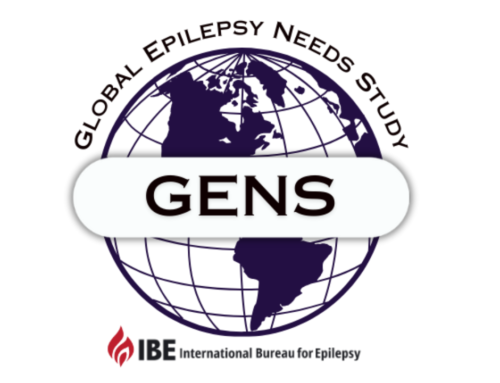EMBARGO 21 JULY
9.00 a.m.CET
22 July: World Brain Day 2015 devoted to epilepsy
“Epilepsy is more than seizures” – Global awareness-raising for the underestimated burden of epilepsy – 75-80 percent of people with epilepsy in low income countries do not have access to medication
“Epilepsy is more than seizures” is the motto of this year’s World Brain Day. This awareness campaign initiated by the World Federation of Neurology (WFN) and staged all over the world every year on 22 July is dedicated to bringing more attention to the importance of brain health and the prevention of brain diseases. This year, the WFN’s awareness efforts are supported also by the International Bureau for Epilepsy, the International League Against Epilepsy and the World Health Organization. More than 50 million people worldwide live with epilepsy, but diagnostic and therapeutic resources are unequally distributed globally.
London, July 2015 – “Epilepsy is one of the most common chronic neurological diseases. It is estimated to affect more than 50 million people around the world, and about 2.4 million people are newly diagnosed every year”, according to Dr Raad Shakir, President of the World Federation of Neurology (WFN). “However, there is a lack of awareness in the public and among decision makers about the severe consequences for the individuals concerned, their families and societies.” Dr Shakir addressed this appeal to the public on the occasion of this year’s World Brain Day (WBD) on 22 July. This awareness day was launched last year and will be dedicated to a different neurological disease or topic every year. In 2015, the WFN is partnering with the World Health Organization, the International League Against Epilepsy (ILAE) and the International Bureau for Epilepsy (IBE) in order to “bring greater visibility to this neglected disease”, as Dr Shakir puts it. “Just in terms of life years lost from sudden unexpected death, epilepsy ranks second only to stroke among major neurological diseases. Health care and research agendas at the global, regional and national level clearly need to recognize and take into account the seriousness of epilepsy and its consequences. We need joint efforts to ensure that resources are made available for alleviating the social, medical and economic burden borne by those who suffer from a disease that is among the most treatable brain diseases.”
“At least half of the people living with epilepsy worldwide could be easily treated with medicines which cost as little as five USD for one year of treatment. Apart from other causes of seizure-related mortality, an estimated 60,000 people die every year of sudden unexpected death related to epilepsy”, says Dr Emilio Perucca, President of the International League Against Epilepsy (ILAE). “In all societies, people with epilepsy often suffer more from neglect and social isolation than from the medical manifestation of the disease. Devoting World Brain Day to epilepsy is an important contribution to raising awareness and improving the lives of people with epilepsy throughout the world. We are truly grateful to WFN for joining forces with us in the fight against epilepsy.”
“Epilepsy is a disease that can have devastating consequences, affecting all aspects of life. Seizures severely affect the quality of life of people with epilepsy, often leading to social exclusion and depression, increasing the risk of suicide, and premature death. People with epilepsy are stigmatized and discriminated against in many social activities, in their education and employment. The International Bureau for Epilepsy representing the most influential voice in this setting, people with epilepsy and their families, has developed a strong communication with ILAE. As a consequence, they have established joint Task Forces, common activities such as the International Epilepsy Day and common initiatives such as to put the topic ‘Global burden of epilepsy and the need for coordinated action at the country level’ on the agenda of the World Health Assembly”, says Dr Athanasios Covanis, President of the International Bureau for Epilepsy (IBE). “We hope that this year’s World Brain Day helps in getting closer to our aims such as public awareness and education, protect the human rights of people with epilepsy, prevent the disease wherever possible and increase investment in epilepsy research.”
Epilepsy is a neurological disease characterized by recurrent seizures which are due to brief disturbances in the electrical functions of the brain with excessive electrical discharges in a group of brain cells. The type of seizure depends on which area of the brain is involved. A person having a seizure may experience an alteration in behaviour, consciousness, movement, perception and/or sensation. In the majority of cases, the cause for the epileptic seizures is known, including origins such as genetic conditions, abnormalities in brain development, stroke, head injuries and brain trauma, infections, tumour or brain damage during or after delivery.
High proportion of the world population is not getting adequate care
“The burden of illness is unevenly distributed, with some neurological disorders more common in different parts of the world. Epilepsy is one of them. There are twice as many people affected by it in low-income countries”, Prof Wolfgang Grisold, Secretary General of the WFN, points out. “Although great progress has been made in diagnosis and therapy of brain diseases, appalling disparities in the availability of treatment persist, with many people all over the world having either no access or inadequate access to neurological care. Epilepsy is a dramatic example of such inequities. Up to 70 percent of people with epilepsy can become seizure-free with antiepileptic drug treatments, but the proportion of patients who remain untreated at any given time is more than 75 to 80 percent in most low-income countries although cost-effective treatments are available. In addition, in many countries health care providers do not have adequate training to recognize, diagnose or treat epilepsy.”
Epilepsy is more than seizures
“Epilepsy is more than seizures” is a well-chosen motto for this year’s WBD, according to Dr Mohammad Wasay, Chair of the WFN’s Public Awareness and Advocacy Committee: “Although epilepsy is one of the most common chronic neurological diseases and one of the oldest recognized diseases of the brain, there are a number of myths and misconceptions around it. Stigma and discrimination, ignorance and fear cause social isolation and prevent people with epilepsy from seeking treatment. Epilepsy has never received the attention commensurate to its burden. In part this has been because many of the people affected work hard to hide the fact. They fear potential repercussions in many societies that have widespread and unfounded prejudices against people with epilepsy.
Quite wrongly, as is known today. Some of the most exceptionally creative and talented people in history have had epilepsy, including – to name just a few – Julius Caesar, Dante, Jeanne d’Arc, Isaac Newton, Molière, Napoleon Bonaparte, Gustave Flaubert, Niccolo Paganini, George Byron, Charles Dickens, Fyodor Dostoyevsky, Vincent van Gogh, Lewis Caroll, Alfred Nobel, Agatha Christie or Richard Burton.
Epilepsy has also been chosen to be the WBD’s focus in 2015, not least because earlier this year the World Health Assembly adopted a resolution entitled “Global burden of epilepsy and the need for coordinated actions at the country level to address its health, social and public knowledge implications”. This resolution is a call for action from member countries and stakeholders to strengthen their efforts in providing care for people with epilepsy. The resolution also highlights the need for governments to formulate, strengthen and implement national policies and legislation to promote and protect the rights of people with epilepsy. In low- and middle-income settings, strategies to improve access to and affordability of antiepileptic medicines should be a priority.
Brain health needs to be prioritized on the political agenda
“Our World Brain Day initiative is meant as a wake-up call to political decision-makers around the globe. Despite the huge burden they cause, neurological conditions are largely absent from the national and international health agendas”, says WFN President Shakir. “The message we are sending out with the World Brain Day in this respect is clear: Political and funding priorities need to shift; governments and international organisations need to prioritize brain health.
More than 100 national societies spread the campaign
More than 100 national member societies of the WFN are carrying the messages of the World Brain Day to the national, regional and local levels by holding events and implementing educational and awareness activities. They are being joined by national chapters of ILAE and IBE. To support their activities onsite, WFN is providing promotional and educational materials such as posters, brochures and presentations. An important focus of the campaign is on the use of social media, in particular Facebook and twitter.
Promotional and material relating to the World Brain Day: www.wfneurology.org/
WFN on Facebook: www.facebook.com/wfneurology?fref=ts
WFN on twitter: @wfneurology
Hashtag: #WorldBrainDay
WFN – World Brain Day Press Office
Dr Birgit Kofler
B&K – Bettschart & Kofler
E-mail: [email protected]
Mobile: +43 676 636 89 30
Phone Vienna office: +43 1 319 43 78 13





